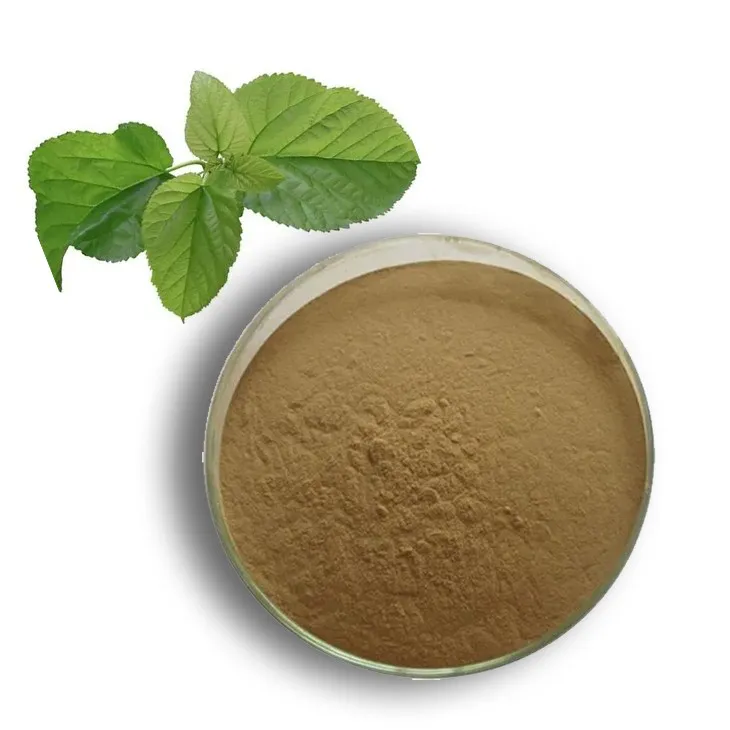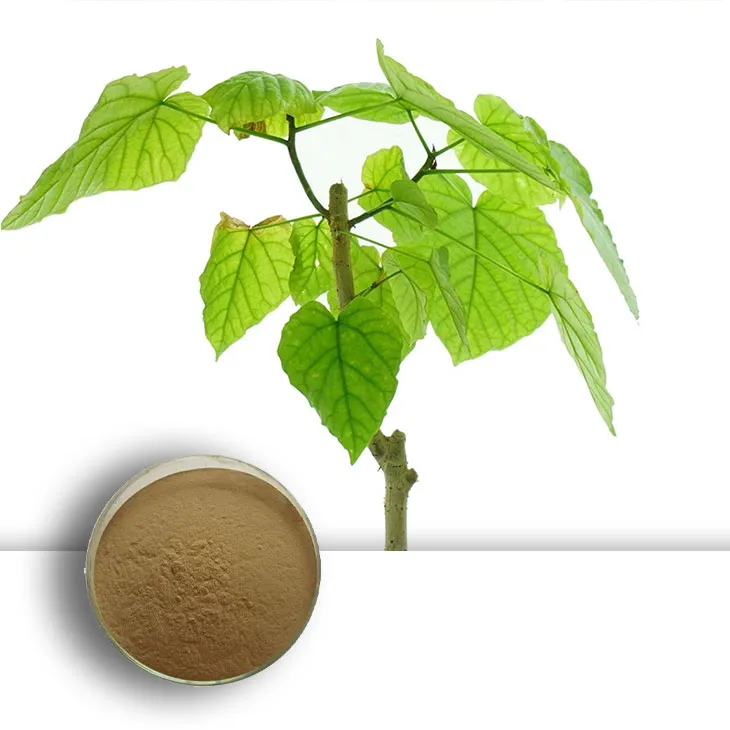- 0086-571-85302990
- sales@greenskybio.com
Mulberry Leaf Extract: Is the extract effective for weight loss?
2024-11-14

1. Introduction
In the pursuit of effective weight - loss solutions, many individuals are constantly exploring various natural products. One such product that has gained attention in recent years is Mulberry leaf Extract. With the increasing prevalence of obesity and related health issues, understanding the potential of this extract for weight management becomes crucial. This article aims to comprehensively examine the effectiveness of Mulberry leaf Extract for weight loss, considering different aspects including its chemical composition, how it interacts with the body, and its short - and long - term effects, as well as comparing it with other common weight - loss aids.

2. Chemical Constituents of Mulberry leaf Extract
Mulberry leaves are rich in several bioactive compounds that may play a role in weight loss. One of the key components is 1 - deoxynojirimycin (DNJ).
2.1 1 - Deoxynojirimycin (DNJ)
DNJ is an alkaloid that has been shown to inhibit the activity of alpha - glucosidase. This enzyme is involved in the breakdown of carbohydrates in the small intestine. By inhibiting alpha - glucosidase, DNJ slows down the digestion and absorption of carbohydrates, which can potentially lead to a reduction in blood glucose levels after meals. This mechanism may also contribute to weight loss as it can help in controlling calorie intake from carbohydrates. When carbohydrates are digested more slowly, the body has more time to utilize the energy released, reducing the likelihood of excess energy being stored as fat.
Another important group of compounds in mulberry leaf extract are flavonoids.
2.2 Flavonoids
Flavonoids in mulberry leaves have antioxidant properties. They can scavenge free radicals in the body, reducing oxidative stress. Oxidative stress has been associated with various metabolic disorders, including obesity. By reducing oxidative stress, flavonoids may help improve metabolic function. Some flavonoids also have the potential to regulate lipid metabolism. For example, they may inhibit the synthesis of fatty acids or promote the breakdown of triglycerides in adipose tissue. This can lead to a decrease in body fat levels over time.

3. Interaction with the Body
The way mulberry leaf extract interacts with the body is complex and multi - faceted.
3.1 Gastrointestinal Tract
As mentioned earlier, in the gastrointestinal tract, the DNJ in mulberry leaf extract inhibits alpha - glucosidase. This not only affects carbohydrate digestion but also has an impact on the gut microbiota. Slower carbohydrate digestion can change the nutrient availability in the gut, which may selectively promote the growth of certain beneficial bacteria. These beneficial bacteria can further influence the host's metabolism. For example, they may produce short - chain fatty acids, which have been shown to have various health benefits, including potential effects on weight regulation. The flavonoids in the extract can also interact with the gut epithelium, modulating its function and permeability. A healthy gut epithelium is important for proper nutrient absorption and preventing the translocation of endotoxins, which can cause inflammation and disrupt metabolic homeostasis.
3.2 Endocrine System
Mulberry leaf extract may also interact with the endocrine system. There is some evidence to suggest that it can influence insulin secretion and sensitivity. By improving insulin sensitivity, the body can better regulate blood glucose levels. This is important for weight loss as insulin resistance is often associated with obesity. When insulin sensitivity is improved, the body is less likely to store excess glucose as fat. Additionally, some components of the extract may interact with hormones involved in appetite regulation, such as leptin and ghrelin. Leptin is a hormone that signals satiety to the brain, while ghrelin is known as the "hunger hormone". If mulberry leaf extract can modulate the levels or activity of these hormones, it may help in reducing appetite and controlling food intake.

4. Short - Term Effects on Weight Loss
Several short - term studies have been conducted to evaluate the impact of mulberry leaf extract on weight loss.
4.1 Carbohydrate Digestion and Blood Glucose
In the short term, the inhibition of alpha - glucosidase by DNJ in mulberry leaf extract can lead to a reduction in post - meal blood glucose spikes. This can be beneficial for individuals with diabetes or those at risk of developing diabetes. However, in terms of direct weight loss, the reduction in blood glucose may lead to a decrease in the amount of glucose available for storage as glycogen in the liver and muscles. Once glycogen stores are full, excess glucose is typically converted to fat. By reducing post - meal blood glucose, mulberry leaf extract may potentially limit the amount of excess glucose that can be converted to fat, contributing to short - term weight management.
4.2 Appetite Suppression
Some short - term studies have also suggested that mulberry leaf extract may have an appetite - suppressing effect. This could be due to its interaction with hormones like leptin and ghrelin or through other mechanisms. If individuals consume less food due to reduced appetite, they are likely to take in fewer calories, which can result in short - term weight loss. However, more research is needed to fully understand the extent and consistency of this appetite - suppressing effect.
5. Long - Term Effects on Weight Loss
Long - term effects of mulberry leaf extract on weight loss are also an important consideration.
5.1 Metabolic Adaptation
Over time, continued use of mulberry leaf extract may lead to metabolic adaptation. For example, if the extract consistently helps in regulating blood glucose and insulin levels, the body's metabolic processes may become more efficient. This could include improved mitochondrial function, which is responsible for energy production at the cellular level. With more efficient metabolism, the body may be better able to burn calories, leading to long - term weight loss. Additionally, the long - term regulation of lipid metabolism by flavonoids in the extract may result in a gradual reduction in body fat percentage.
5.2 Gut Microbiota Modulation
Long - term consumption of mulberry leaf extract can have a more profound impact on the gut microbiota. As mentioned earlier, changes in the gut microbiota can influence the host's metabolism. By promoting the growth of beneficial bacteria over time, the extract may contribute to a more favorable metabolic profile. For example, beneficial bacteria can help in the breakdown of dietary fiber and the production of beneficial metabolites, which can enhance energy expenditure and fat metabolism. This long - term modulation of the gut microbiota may be an important factor in sustainable weight loss.
6. Comparison with Other Weight - Loss Aids
When considering mulberry leaf extract as a weight - loss aid, it is important to compare it with other available options.
6.1 Prescription Weight - Loss Drugs
Prescription weight - loss drugs such as orlistat and phentermine - topiramate work through different mechanisms. Orlistat inhibits the absorption of dietary fat in the intestines, while phentermine - topiramate affects the central nervous system to reduce appetite. In contrast, mulberry leaf extract mainly targets carbohydrate digestion and metabolism, as well as has potential effects on the endocrine and gut microbiota systems. While prescription drugs may show more rapid and significant weight loss in some cases, they also come with potential side effects, such as gastrointestinal distress for orlistat and neurological effects for phentermine - topiramate. Mulberry leaf extract, on the other hand, is generally considered to be a natural and relatively safe alternative, although more research is needed to fully establish its safety profile.
6.2 Dietary Supplements
There are many dietary supplements on the market for weight loss, such as Green Tea Extract and Garcinia cambogia extract. Green Tea Extract contains catechins that are believed to increase thermogenesis, the process by which the body burns calories to produce heat. Garcinia cambogia extract contains hydroxycitric acid (HCA) which is thought to suppress appetite and inhibit fat synthesis. Mulberry leaf extract differs from these in its mode of action. While Green Tea Extract focuses on thermogenesis and Garcinia cambogia on appetite and fat synthesis, mulberry leaf extract has a broader range of effects including carbohydrate digestion, gut microbiota modulation, and potential endocrine regulation.
7. Conclusion
In conclusion, mulberry leaf extract shows potential for weight loss through its various mechanisms of action. Its chemical constituents, such as DNJ and flavonoids, interact with the body in ways that can affect carbohydrate digestion, blood glucose regulation, appetite, and the gut microbiota. In the short term, it may help in reducing post - meal blood glucose spikes and suppressing appetite, while in the long term, it may lead to metabolic adaptation and more favorable gut microbiota composition. When compared with other weight - loss aids, it has a unique mode of action. However, more research is still needed to fully understand its effectiveness, optimal dosage, and long - term safety. As with any weight - loss approach, it should be used in conjunction with a healthy diet and regular exercise for the best results.
FAQ:
What are the main chemical constituents in mulberry leaf extract that might be related to weight loss?
The main chemical constituents in mulberry leaf extract that may be related to weight loss include alkaloids such as 1 - deoxynojirimycin (DNJ). DNJ can inhibit the activity of alpha - glucosidase, which is an enzyme involved in the breakdown of carbohydrates in the intestine. By inhibiting this enzyme, the absorption of glucose from the diet may be slowed down, potentially leading to reduced calorie intake and thus contributing to weight loss.
What are the short - term effects of taking mulberry leaf extract for weight loss?
In the short - term, some people may experience a mild reduction in appetite after taking mulberry leaf extract. This could be due to the effects of its chemical components on the body's hormonal regulation related to hunger and satiety. Also, there may be a slight improvement in blood sugar levels, which can indirectly affect energy metabolism. However, these short - term effects can vary greatly from person to person depending on factors such as individual metabolism, diet, and overall health.
What are the long - term effects of using mulberry leaf extract for weight loss?
Long - term use of mulberry leaf extract for weight loss is still not fully understood. Some potential long - term effects could include continued support for blood sugar regulation, which may help prevent excessive fat storage over time. However, there may also be concerns such as potential nutrient deficiencies if the extract affects the absorption of certain nutrients in the long run. Additionally, more research is needed to determine if there are any cumulative effects on the body's organs or hormonal systems.
How does mulberry leaf extract compare with other weight - loss aids?
Compared to some common weight - loss aids like stimulants (e.g., caffeine - based products), mulberry leaf extract has a different mode of action. Stimulants often increase energy expenditure by boosting metabolism or suppressing appetite through central nervous system stimulation. In contrast, mulberry leaf extract mainly focuses on carbohydrate metabolism regulation. Also, compared to some prescription weight - loss drugs that may have more significant side effects, mulberry leaf extract is generally considered to be a more natural alternative, but its effectiveness may be less pronounced. However, unlike some dietary fiber - based weight - loss aids that mainly work by increasing satiety, mulberry leaf extract's mechanism is more related to its impact on the digestive enzyme.
Is it safe to take mulberry leaf extract for weight loss?
For most people, taking mulberry leaf extract in moderation is generally considered safe for weight loss. However, some individuals may be allergic to mulberry or its components, and in such cases, it can cause allergic reactions. Also, if taken in excessive amounts, it may disrupt normal digestive processes or interact with certain medications. Pregnant or breastfeeding women should be especially cautious, as the safety of mulberry leaf extract during these periods has not been fully established.
Related literature
- The Effects of Mulberry Leaf Extract on Obesity: A Review"
- "Mulberry Leaf Extract: Chemical Composition and Potential Role in Weight Management"
- "Comparative Study of Mulberry Leaf Extract and Other Natural Weight - Loss Supplements"
- ▶ Hesperidin
- ▶ Citrus Bioflavonoids
- ▶ Plant Extract
- ▶ lycopene
- ▶ Diosmin
- ▶ Grape seed extract
- ▶ Sea buckthorn Juice Powder
- ▶ Fruit Juice Powder
- ▶ Hops Extract
- ▶ Artichoke Extract
- ▶ Mushroom extract
- ▶ Astaxanthin
- ▶ Green Tea Extract
- ▶ Curcumin
- ▶ Horse Chestnut Extract
- ▶ Other Product
- ▶ Boswellia Serrata Extract
- ▶ Resveratrol
- ▶ Marigold Extract
- ▶ Grape Leaf Extract
- ▶ New Product
- ▶ Aminolevulinic acid
- ▶ Cranberry Extract
- ▶ Red Yeast Rice
- ▶ Red Wine Extract
-
Green Tea Extract
2024-11-14
-
Chaste Berry Extract
2024-11-14
-
Garcinia Cambogia Extract
2024-11-14
-
Peppermint Extract Powder
2024-11-14
-
Chasteberry Extract
2024-11-14
-
Curcumin Extract
2024-11-14
-
Red Date Extract
2024-11-14
-
Sophora Japonica Flower Extract
2024-11-14
-
Mangosteen extract powder
2024-11-14
-
Oat Straw Extract Powder
2024-11-14





















